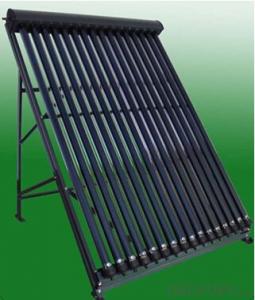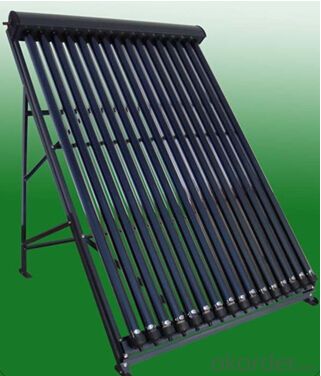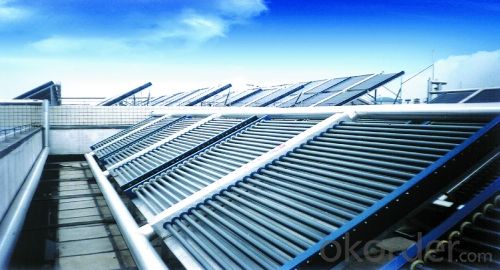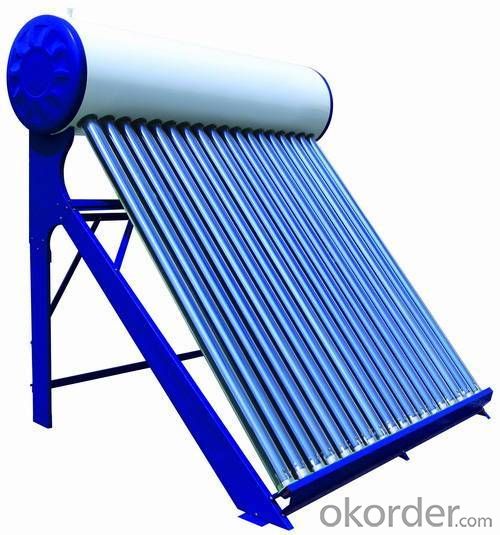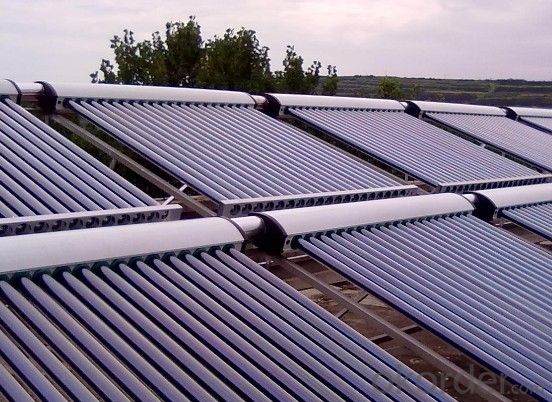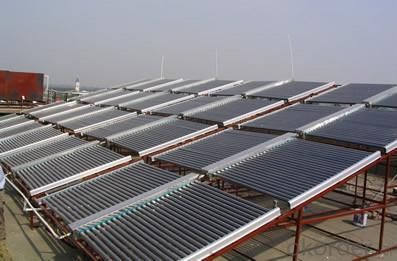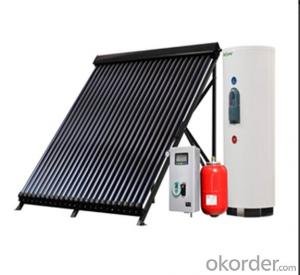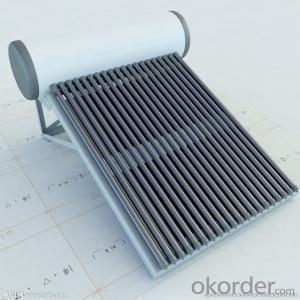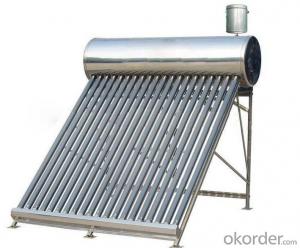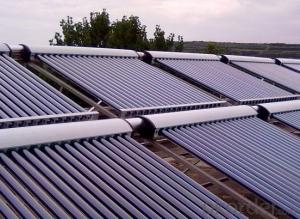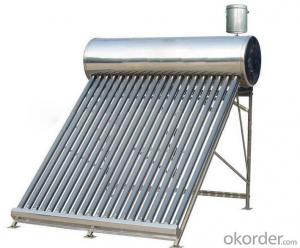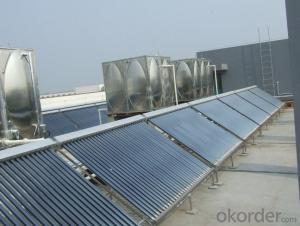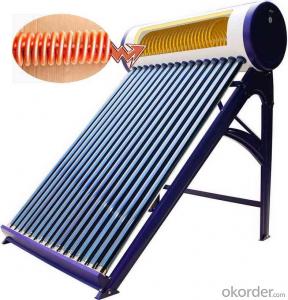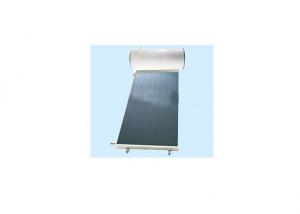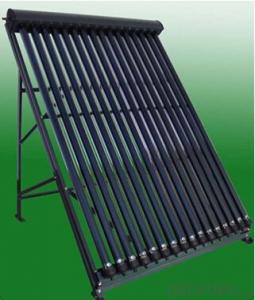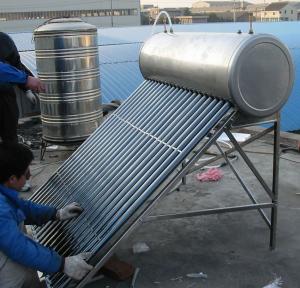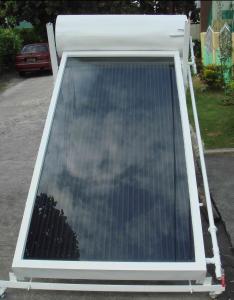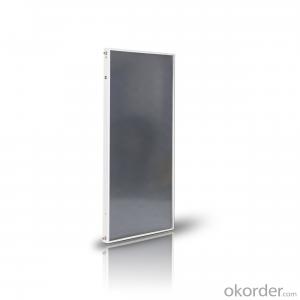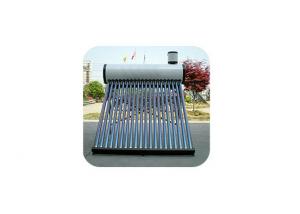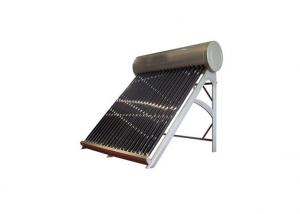Outdoor Solar Water Heater - Galvanized Steel Solar Hot Water Heater with Good Quality
- Loading Port:
- China main port
- Payment Terms:
- TT OR LC
- Min Order Qty:
- 10 set
- Supply Capability:
- 1000 set/month
OKorder Service Pledge
OKorder Financial Service
You Might Also Like
Working Principle of Domestic Solar Water Heaters:
Solar energy, in essence, is an electromagnetic wave, a type of strong optical radiation, which is produced by thermonuclear fusion reaction. The energy of the solar radiation is transmitted through the liught of different wave length. The solar water heater is designed to mainly take in the energy of visible light & near ultra red light through the selective absorbing coating of vacuum tubes.When the water in the solar collector is heated by the solar radiation, its temperature rises. As a result, the water in the solar collector and the water in the tank form natural convection because of density contrast casued by the temperature difference. So the water of the higher temperature is incessantly forced into the insulated solar water tank( As shown in the figure).
Description Of Solar Water Heater
Specification: | |
Solar heat storage tank diameter(mm) | |
Thickness,insulated(mm) | 50/60 |
Vent connection(inch) | 1/2 |
Electric heater connection(inch) | 47 |
Water connection(inch) | 1/2 or 3/4 |
Frame angle(degree) | 23/25/30/45 |
Feature: | |
1.Super anti-erode outer tank:Outer tank is made by stainless steel 304or PVDF.Best anti-erode material,Especial for the seaside area,such as East South Asia,Mexico etc. | |
2.Feeding water automatic:with special design,feeding water automatic,and ensure the outlet water as stable temperature. | |
3.We design to install eith the solar PV panel supplying the lighting and the cell dhone charger. | |
Material: | |
1.Inner tank:stainless steel SUS304 | |
2.Vacuum tube:QB-AL-N/AL-47*1500/58*1800 | |
3.Outer tank:stainless steel SUS304/SUS316/PVDF color steel | |
4.Frame:coated galvanized steel -1.5mm;Aliminum alloy steel2.0mm | |
5.The material of insulation:polyurethane50/60mm | |
6.The reflector:aluminum component;AL 99.85% surface oxidation;stainless steel | |
Key Features
Power Supply: 220VAC; power dissipation:<5w.< span="">
Temperature Measure Accuracy: ± 2 degree
Temperature Measuring Range:0-99 degree
Temperature Control Accuracy: ± 2 degree
Temperature Grading: 5, Loop-shaped meter display
Controllable water pump or ribbon heater power: ≤500W
Controllable heating power: ≤1500W(optional 3000W available)
Residual Operating current: ≤10mA/0.1s.
Magnetic Valve Parameters: DC12V (non pressurized valve available)
working pressure of the unpressurized valve:0.0MPa.
Applicable to water feeding to the water tank or low pressure water feeding.
Product Details Show
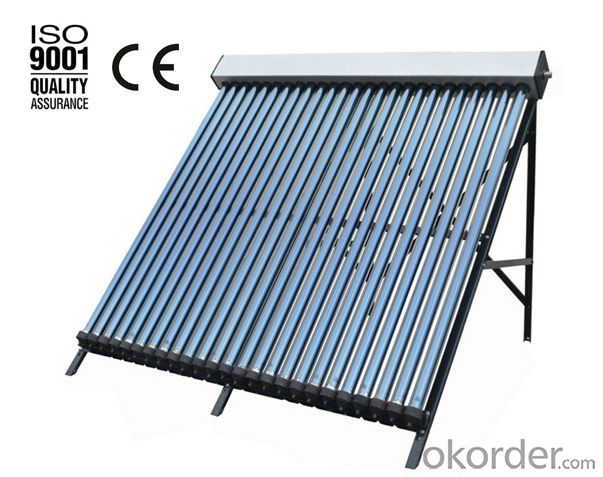
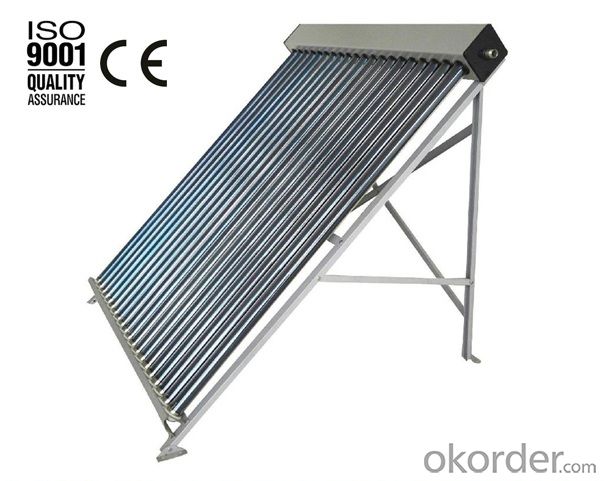
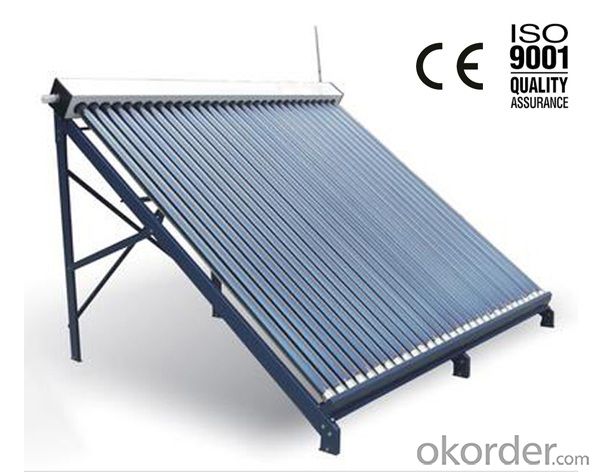
Packing and Shipping
Packaging Details: | Packing in Neutral Master carton 4ctns/set |
Delivery Detail: | within 5 days after receiving the deposit |
By Sea | Delivery from Guangzhou or Shenzhen seaport |
By Air | Departure from Guangzhou Airport |
By Express | Post by DHL, EMS, UPS, TNT. |
FAQ
1. Q: Are you a factory or trading company?
A: We are a factory. Especially for Solar Controller, PWM solar controller 50A12V/24V
2. Q: Where is your factory located? How can I visit there?
A: Our factory is located in Guangzhou, China. You are warmly welcomed to visit us!
3. Q: what other product you have except such Solar Lighting?
A: We have poly ,mono cells and panels. Off grid solar system, like off grid solar inverter, pure sine wave inverter, solar collector, solar controller, solar charger, Portal solar system, battery, DC Fan, Solar Led Light.
4. Q: Can the price be cheaper?
A: Of course, you will be offered a good discount for big amount.
5. How can I get a sample?
A: Please call us or send email for asking the samples.
- Q: Can a solar water heater be used to heat swimming pools?
- Yes, a solar water heater can be used to effectively and efficiently heat swimming pools. Solar water heaters harness the energy from the sun to heat water, and this heat can be transferred to the swimming pool through a circulation system. By utilizing solar energy, it is a sustainable and cost-effective way to maintain a desired temperature in a swimming pool.
- Q: What is the required maintenance skill level for a solar water heater?
- The required maintenance skill level for a solar water heater can vary depending on the specific system. However, in general, basic maintenance skills are usually sufficient. This may include tasks such as regularly checking and cleaning the solar panels, inspecting and tightening connections, monitoring the system's performance, and replacing any faulty components if necessary. Some more complex maintenance tasks, such as troubleshooting electrical issues or repairing plumbing connections, may require a higher skill level or the assistance of a professional.
- Q: Can a solar water heater be used in areas with high levels of wind erosion?
- Yes, a solar water heater can be used in areas with high levels of wind erosion. The performance of the solar water heater may not be affected by wind erosion, as long as the system is properly installed and maintained. However, it is important to ensure that the solar water heater is protected against any physical damage caused by windblown particles or debris.
- Q: How does a solar water heater affect water heater noise levels?
- Compared to traditional water heaters, a solar water heater can greatly decrease the noise level caused by the heating process. This is because solar water heaters do not rely on a burner or heating element that constantly operates to heat the water. Instead, they utilize the sun's energy to heat the water, eliminating the need for mechanical parts that generate noise. In contrast, traditional water heaters usually produce noise during the combustion process, where the burner ignites and heats the water. This combustion process can create a continuous humming or rumbling sound, especially when the water heater is actively heating water. Additionally, electric water heaters with heating elements can also generate a buzzing or humming noise. On the other hand, solar water heaters operate silently as they do not have a combustion process or heating element that generates noise. Instead, they use solar panels or collectors to absorb the sun's energy and transfer it to the water through a heat exchanger. As a result, solar water heaters do not contribute to the overall noise levels in a household. Thus, if reducing noise is a concern, choosing a solar water heater is an excellent solution. Not only does it offer a more environmentally-friendly and cost-effective method of heating water, but it also eliminates the noise associated with traditional water heaters, creating a quieter and more serene environment.
- Q: Solar water heater water pipe with plastic tube or PPR tube good
- PPR tube low temperature tolerance. PPR has a cold brittleness (brittle point of -20 degrees C), in winter (5 degrees Celsius) when the construction of special care. Aluminum plastic pipe without cold brittleness (brittle point is -70 DEG C), can be easily installed below -20 C. Heat resistance of PPR pipe is lower than that of aluminum tube. PPR long-term use temperature of 70 degrees C (50 years, 1MPa), the maximum use temperature of 95 degrees C; long term use of aluminum plastic pipe temperature of 95 degrees C (, 1MPa), the maximum use temperature of 110 degrees C.
- Q: How does the efficiency of a solar water heater vary with different designs?
- The efficiency of a solar water heater can vary significantly depending on the design. There are several factors that contribute to this variation. Firstly, the type of collector used in the solar water heater plays a crucial role in its efficiency. Flat plate collectors, which consist of a flat absorber plate covered with a transparent cover, are commonly used. These collectors are efficient in converting sunlight into heat, but their efficiency can be affected by factors such as the material used for the absorber plate and the thickness of the cover. On the other hand, evacuated tube collectors, which consist of multiple glass tubes with a vacuum inside, are known for their high efficiency. The vacuum insulation reduces heat loss, resulting in better performance even in colder climates. Secondly, the size and orientation of the collector also impact the efficiency of a solar water heater. A larger collector area allows for more sunlight to be captured, increasing the amount of heat generated. Similarly, the orientation of the collector should be optimized to receive maximum sunlight throughout the day. Ideally, the collector should be positioned facing the equator to receive the most direct sunlight. Thirdly, the heat storage capacity and insulation of the system affect efficiency. Solar water heaters often incorporate a storage tank to store the heated water. The size and insulation of this tank influence how well the heat is retained. Larger tanks with better insulation can store more heat, ensuring a steady supply of hot water even during periods of low sunlight. Lastly, the control system integrated into the solar water heater can impact its efficiency. Advanced control systems can monitor the temperature of the water and adjust the flow of heat accordingly. This ensures optimal performance and prevents overheating or wastage of energy. In summary, the efficiency of a solar water heater varies with different designs due to factors such as the collector type, size, orientation, heat storage capacity, insulation, and control system. It is essential to carefully consider these design elements to maximize the efficiency and effectiveness of the solar water heating system.
- Q: Solar water heater intelligent measuring and controlling instrument. How to cancel the timing
- According to the hot water heater you buy is not the same, but roughly the same, for my reference:
- Q: How does a solar water heater perform in coastal areas?
- A solar water heater performs well in coastal areas due to the abundance of sunlight and the relatively mild climate. The proximity to the ocean helps regulate the temperature, minimizing extreme hot or cold conditions, which can enhance the efficiency of the system. However, the salty and corrosive air near the coast may require more frequent maintenance to ensure optimal performance and longevity of the solar water heater.
- Q: How does the energy output of a solar water heater compare to a traditional water heating system?
- The energy output of a solar water heater is generally higher than that of a traditional water heating system. Solar water heaters utilize energy from the sun to heat the water, which is a renewable and abundant source. In contrast, traditional water heating systems typically rely on fossil fuels or electricity, which may be more limited and expensive. Consequently, solar water heaters are more energy-efficient and environmentally friendly, leading to potentially lower energy costs and reduced carbon emissions.
- Q: Can a solar water heater be used in areas with limited access to water sources?
- Yes, a solar water heater can be used in areas with limited access to water sources. Solar water heaters primarily rely on solar energy to heat water, and they can be designed to operate with minimal water requirements. This means that even in areas with limited access to water, a solar water heater can still be an effective and sustainable solution for heating water.
Send your message to us
Outdoor Solar Water Heater - Galvanized Steel Solar Hot Water Heater with Good Quality
- Loading Port:
- China main port
- Payment Terms:
- TT OR LC
- Min Order Qty:
- 10 set
- Supply Capability:
- 1000 set/month
OKorder Service Pledge
OKorder Financial Service
Similar products
Hot products
Hot Searches
Related keywords
